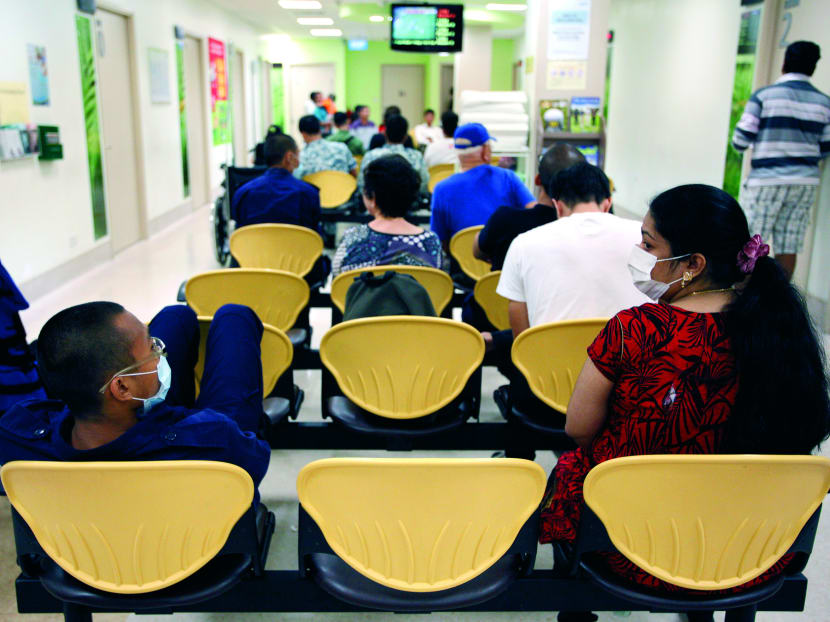Fee guidelines among proposals to limit health costs
SINGAPORE — With the one-year freeze on Integrated Shield Plan (IP) health insurance premiums nearing its end, an industry-led taskforce on Thursday (Oct 13) warned that current levels of premiums for IPs and IP riders are becoming unsustainable.
SINGAPORE — With the one-year freeze on Integrated Shield Plan (IP) health insurance premiums nearing its end, an industry-led taskforce on Thursday (Oct 13) warned that current levels of premiums for IPs and IP riders are becoming unsustainable.
The taskforce also called for measures to rein in escalating claims for IPs.
IPs provide additional coverage to MediShield Life, by covering stays in private hospitals and Class A or B1 wards at public hospitals, while IP riders help to cover various out-of-pocket healthcare expenses.
Set up in February to examine the cost of healthcare insurance, the 11-member taskforce was chaired by Ms Mimi Ho of consultancy firm Regulatory Professionals and included representatives from the Life Insurance Association (LIA), the Ministry of Health (MOH) and Monetary Authority of Singapore. Among other recommendations, it proposed medical fee guidelines to improve transparency of medical costs and to tackle any over-charging by providers.
The removal of the Singapore Medical Association’s fee guidelines in 2007 — after being deemed anti-competitive by the authorities — has resulted in a lack of available benchmarks that insurers could refer to, to detect inflated claims, the taskforce noted in its report.
LIA’s data showed instances of private hospitals and doctors possibly over-charging patients by inflating certain components of the bill and unbundling certain routine laboratory tests for higher total billing, or charging excessive amounts for consumables. Patients are “often not in the position to identify anomalies in medical treatment”, the taskforce said. It added that insurers with medically trained staff would be more a ble to do so, but it is difficult to definitively determine instances of inappropriate treatment without full knowledge of the clinical circumstances.
The taskforce also sought more clarity on existing processes for insurers to report cases of inappropriate medical treatment to the authorities. Insurers could consider using preferred panels of healthcare providers to manage medical costs, and designing insurance products to have deductibles or co-insurance — which would entail some out-of-pocket payment by policyholders — to encourage greater awareness of their medical costs, it said.
If preferred healthcare-provider panels are set up, however, insurers should make clear to customers that their choice of healthcare providers is not restricted by the existence of the panels, although the coverage could be affected, the taskforce said.
Any introduction of deductibles (the amount consumers must pay before insurance kicks in) or co-insurance should not put existing policyholders at a disadvantage.
The taskforce added that insurers can be encouraged to approve claims for medical treatment and estimated bill size before the actual procedure, to provide certainty to patients on what can be claimed from their insurance policy. This will address the risks of inappropriate treatment and high medical charges.
LIA also trotted out findings of a study done last year on the cost of health insurance in Singapore. It found cost inflation at private hospitals outpacing public hospitals, based on bill data between 2012 and 2014. There was a marked difference in surgery charges between private hospitals and public hospitals.
A greater proportion of IP policyholders, especially those with riders, were seeking treatment in private hospitals over public hospitals — possibly a sign of the “buffet syndrome” where patients over-consume healthcare when the financial burden falls on insurers. Two in three Singapore residents have IPs and half of these policyholders also have IP riders.
While “natural” factors such as the ageing population, better access to medical facilities and advances in medical research lead to an increase in frequency of medical treatment and charges, there is undesirable behaviour to be discouraged or eliminated, said the taskforce.
The increase in IP claims will outpace initial “savings” accorded by increased coverage limits under MediShield Life, which took effect in November last year, it noted. Insurers expect growth in claims in non-subsidised ward classes (B1, A Class and private hospitals) to be greater than the increased coverage by MediShield Life, a basic universal scheme aimed at covering hospital bills in B2 and C Class wards.
MOH welcomed the taskforce’s report and said it was timely. However, it did not respond specifically to the call for fee guidelines.
MOH currently publishes “Total Hospital Bill” data for common conditions and “Total Operation Fees” for common surgical procedures for both public and private hospitals - following an announcement last week that total operation fees of the private sector would be included among the data published on its website. The ministry said it will “continue to work with healthcare providers and IP insurers on ways to further improve fee transparency”.
“Over the past few years, the Government has taken significant steps to improve healthcare affordability and health insurance coverage for Singaporeans through measures such as the Pioneer Generation Package, subsidy enhancements and MediShield Life,” MOH said. Stakeholders such as insurers, healthcare service providers, policyholders and patients also have an important role to play, and must work together “to ensure the longer-term sustainability of Singapore’s healthcare system”, it added.
Five IP insurers (AIA, Great Eastern, Prudential, NTUC Income and Aviva) had announced last year that the top-up portion of IP premiums would be frozen during the first year of MediShield Life. A sixth IP insurer, AXA, came on board in May.







